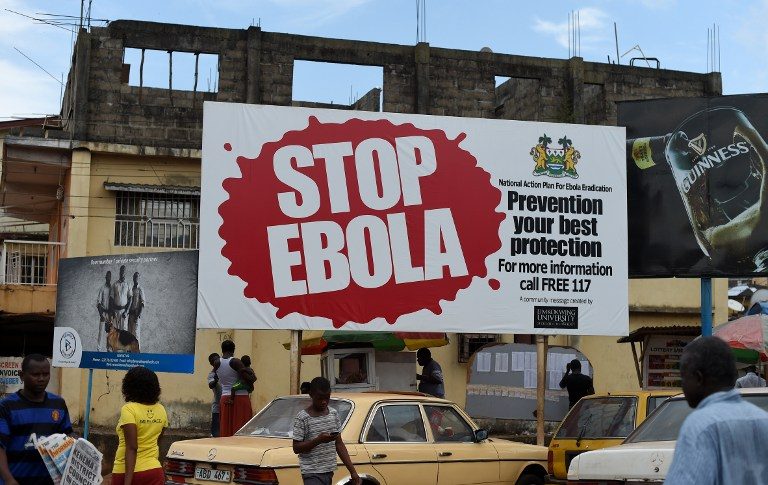SUMMARY
This is AI generated summarization, which may have errors. For context, always refer to the full article.

FREETOWN, Sierra Leone – Sierra Leone said on Wednesday, February 25, it was seeing a spike in Ebola infections, blaming unsafe burials that threaten to undermine the recovery from the deadly epidemic.
The west African nation, which has registered some 3,400 deaths in the nine months since the outbreak spread from neighboring Guinea, had seen a steady decline in new cases over recent months.
But it has warned that the trend was being threatened by people flouting a ban on traditional funeral rites, seen as a key factor in the spread of the highly infectious virus.
Palo Conteh, head of the government’s National Ebola Response Centre, told reporters in the capital Freetown that the daily count of infections had risen to a peak of 16 so far this week.
In the previous week the daily tally had dropped as low as two, he said.
“We warned then against complacency and stated clearly that we must anticipate spikes in cases as we strive to get to zero,” Conteh added.
“These numbers are rising because people continue to flout the law with impunity.”
Ebola, one of the deadliest viruses known to man, is spread only through direct contact with the bodily fluids of the recently deceased or an infected person showing symptoms such as fever or vomiting.
Preventing unsafe burials has been a top priority in the response to the epidemic, yet the World Health Organization (WHO) says Sierra Leone reported 45 in a single week up to February 15.
Families of victims are supposed to inform the authorities, who ask Red Cross experts dressed in biohazard suits and carrying disinfectant to bury the bodies.
Conteh said funeral homes had also reopened illegally across the country, accepting medical certificates as proof that the deceased were Ebola-free.
“Let me state that the safe medical and dignified burial policy still stands and I am sending a strong warning to all district medical officers, heads of hospitals and municipalities to desist from issuing certificates that permit people to embark on unsafe burials,” he said.
‘Collective duty’
The WHO said in its latest update on Wednesday that, as of Sunday, 9,589 people had died of Ebola since the epidemic emerged in southern Guinea in December 2013.
Liberia has registered the highest death toll of 4,037 fatal cases while Sierra Leone has seen almost half of the total of 23,694 cases.
While Liberia is showing only a tiny handful of new cases each week, Guinea and Sierra Leone continue to be a worry to the authorities, who say they still do not have the epidemic under control.
Sierra Leone is halfway through a two-week door-to-door operation in the hard-hit Port Loko district, east of Freetown, to find out if families are harboring Ebola patients or concealing bodies.
Conteh said outreach teams had so far uncovered no new cases.
“We sent in a high-level team to beef up the operation and I am happy to report that there has been all-round cooperation,” he said.
Around 25 children were quarantined at the British-run St George Foundation orphanage near Freetown last week after one of its staff was diagnosed with Ebola.
“We are paying particular attention to the residents including the children and assessing the situation daily,” Conteh said.
The leaders of all 3 countries have pledged to eradicate the virus by mid-April.
Guinea said on Wednesday it had launched an awareness campaign in the capital Conakry and several other cities against the practice of unsafe burials.
“One insecure hazardous burial can generate dozens of new cases. We know that we still have sensitive areas and focus our efforts there,” said government spokesman Damantang Albert Camara.
“More than ever, vigilance and mobilization must remain at a maximum. It is a collective and individual duty and a civic responsibility.” – Rappler.com
Add a comment
How does this make you feel?
There are no comments yet. Add your comment to start the conversation.